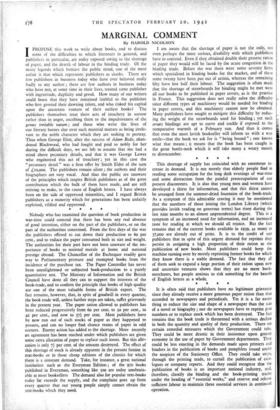MARGINAL COMMENT
By HAROLD NICOLSON
IPROPOSE this week to write about books, and to discuss some of the difficulties to which literature in general, and publishers in particular, are today exposed owing to the shortage of paper, and the dearth of labour in the binding trade. Of the many legends which bemuse the public mind, one of the most unfair is that which represents publishers as sharks. There are few publishers in business today who have ever behaved really badly to any author ; there are few authors in business today who have not, at some time in their lives, treated some publisher with ingratitude, duplicity and greed. How many of our writers could boast that they have remained faithful to the publisher who first greeted their dawning talent, and who risked his capital upon the uncertain venture of their earliest books? The publishers themselves treat these acts of treachery in sorrow rather than in anger, ascribing them to the impulsiveness of the genus irritable vatum ; and those who write the lives of our literary heroes slur over such material matters as being irrele- vant to the noble character which they are seeking to portray. Thus when George Eliot, after the success of Adam Bede, aban- doned Blackwood, who had fought and paid so nobly for her during the difficult days, we are left to assume that she had a mind above pecuniary details, and that it was George Lewes who engineered this act of treachery ; yet in this case the " pecuniary detail " was a firm offer by Smith Elder of the sum of £zo,000. The publishers remain silent ; the authors and their biographers are very vocal. And thus the public are unaware of the principles which inspire British publishers as of the great contribution which the bulk of them have made, and are still striving to make, to the cause of English letters. I have always been on the side of oppressed minorities, and I regard British publishers as a minority which for generations has been unfairly exploited, vilified and oppressed.
•


























 Previous page
Previous page